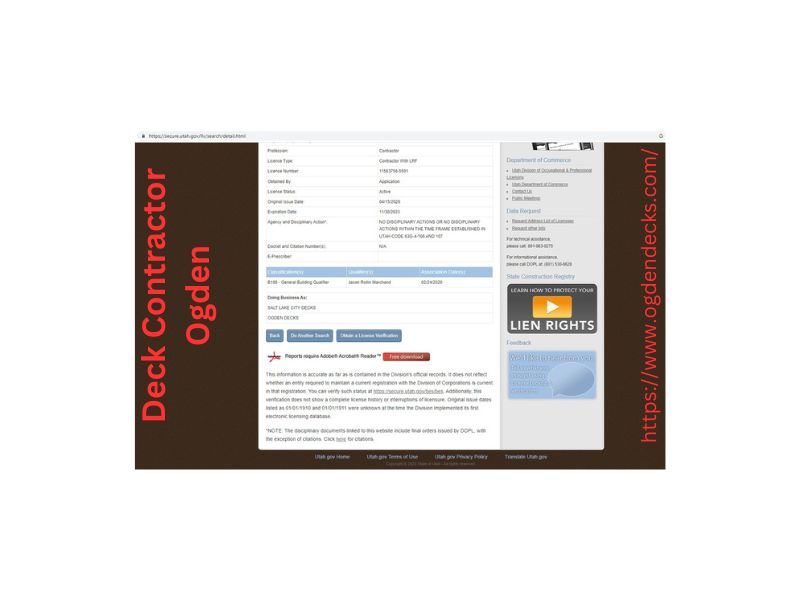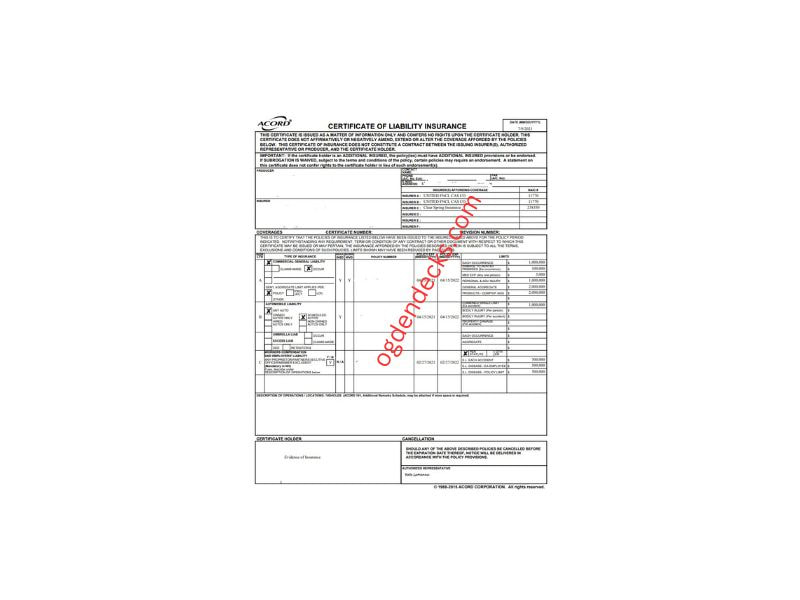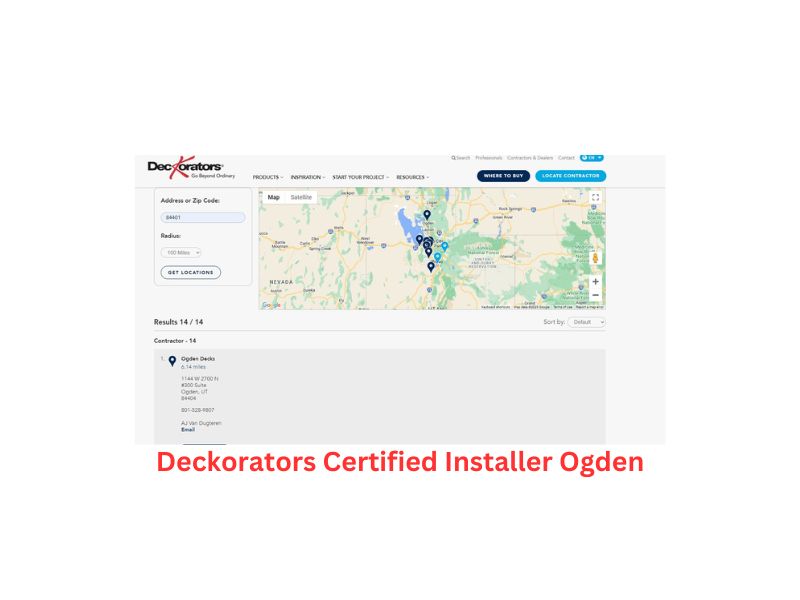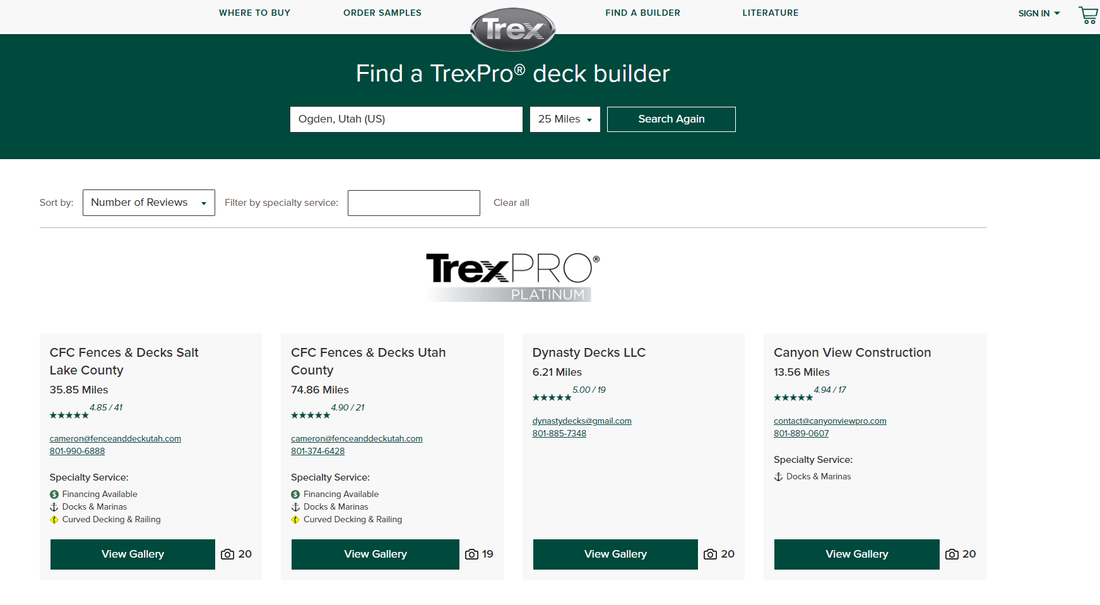|
Decks are a booming business in Utah and it's only expected to get bigger in the next couple of years. However, most homeowners are left feeling overwhelmed or confused on what to look for in selecting their contractor.
It happens several times per year that we are asked to come estimate a deck repair on a project we bid on months/year before only to find the client went with the wrong choice in selecting a contractor. While we will often give some recommendations of other companies to go with or at least become educated with, we only recommend licensed & insured deck builders with a great reputation. We've compiled this educational guide to assist homebuilders on how to select their contractor for their next deck build. And as you'll notice, a lot of these recommendations applies to other projects you hire out as well. Pick a DECK BUILDER!A very common complaint among homeowners is when they picked a "contractor" to do a deck, come to find out they complete 1-2 decks a year. That is not a deck builder.
Would you hire a Doctor that only practiced medicine 1-2 weeks a year? A deck builder builds 1-2 decks per WEEK, ALL year long... It takes a deck builder 1-2 months to typically do more decks than some contractors will their entire career. Typically what we find with these contractors is they use the wrong material, do not install professionally, are not certified on the decking. This leads to problems the products fail, final product does not look good, or the customer is left without a warranty because the contractor wasn't certified. See below for more about certifications, licenses, and warranties. Verify a contractors license and insurance
Finding if a Contractor is licensed is easy visit the State Website
https://secure.utah.gov/llv/searchsecure.utah.gov/llv/search Type in the Name of the Company, in our case: "Ogden Decks" And you should see something like this: Verify InsuranceCheck for insurance, BOTH liability and workers compensation.
In an unofficial study by Ogden Decks posted a job ad for licensed & insured contractors to build a deck. We had 13 companies offer to build the deck in 3 days of posting. Of those 13 companies, 4 had the proper license and insurance. This means70% of the companies would have opened the homeowner to liability if damage/injury occurred on the property. A common tactic is the contractor purchases a cheaper liability policy but does not purchase the more expensive workers compensation. This leaves you on the hook for injuries, talk to an insurance professional for more information. Please be advised this website is for informational purposes only, the picture represents the information present on DOPL's website at the time of making this website. If expired, please run a proper search on us or ANY contractor before hiring as we do not plan to update this page every time our license renews.
Do NOT pay 100% up front to any contractorOccasionally we hear of clients say they won't pay anything to a contractor up front, only after the work is complete. Good luck with that!
A little unknown fact is that by sheer number homeowners damage contractors at a significantly higher rate than contractors damaging homeowners. See a couple of real life examples: Example 1: "Yes, I know we owe you that money but we spent the money on a roof instead can we pay you in a couple of months?" Example 2: "Sorry, I splurged and went on a cruise instead Ill pay you when I get the money" Example 3: "I know that wasn't in the scope of work, but I want you to do that stuff and I'm not paying you until you do it" Fact is people are taken advantage of on both sides of the coin when contracting. While some people would never dream of walking into a store like Walmart or Target and taking something without paying, they will steal from a contractor in a heart beat justifying it as "I paid them enough" or " That should be included with what I paid". All this and contractors typically profit 10-20% on good jobs let alone jobs they ran into hiccups during the project for. That is why most contracting companies that don't take some kind of payment up front, typically aren't in business long. It's most common with licensed reputable companies to arrange a draw system similar to what banks do during home builds. A payment schedule outlined to protect both the customer and the contractor. For example: Small percent down, a draw when material is delivered, payment when framing is done, etc. etc. etc. Beware of any contractor that won't start work until large draws or all of the payment is made ahead of time, beware of the customer that won't pay anything until the job is done. CertificationsWhat is a certification and why does it matter?
Simply put, it helps the customer separate the professionals from the amateur's. Typically to be a certified installer the manufacturer will verify license, insurance, AND here is the important part inspect several decks built by the builder. This ensures: 1. The Deck is Built Safe 2. The Deck will pass warranty standards 3. They aren't putting their name to a sub-par or shady contractor. What does being a certified pro do? Gives the contractor back end access to register the warranty, lets the company know what product was used on the deck, and that it was installed by a certified pro. Why would you risk having a non-certified installer install a deck leaving you vulnerable to warranty or safety issues? These processes are free for the contractor to sign up for they simply need to supply the license/insurance, federal IRS tax ID number, and schedule inspections on their builds. You should ask yourself, why would a deck builder NOT do this? To verify an installer is certified is easy, most of the main manufacturers have a button that says find a builder right on their home page, see below: ShowroomAsk if your contractor has an office you can visit to sign paperwork or view product/material. Typically only the larger more professional contractors have reached the level in which they can support overhead in the form of offices / showrooms.
Please note: Every contractor started in a truck, and there are some really good deck builders that do not have an office. However, those that do you'll know they've been doing it a long time and are good at what they do. ReviewsReviews of contractors are difficult. As a contractor we know that most of our customers regardless of how impressed and happy with the work don't think about leaving reviews.
Upset a client regardless of fault will get back at you anyway they can, IE reviews. Interestingly you also have some review platforms that discreetly let companies know, "Pay for ad's and we'll let bad reviews slip off your profile". In other words they are selective on what reviews are allowed and push those that pay them verse those that don't. A contractor in the business long enough will have reviews, but its also impossible to please everyone so do your due diligence but the biggest concern we would say is no reviews.. That is a sign a company is new or changed their name to escape something. WarrantyDeck Warranty, everyone knows what they are but very few know what they include.
Let's start on the ground: Your footings are they installed using concrete or pylons? Pylons often times are warrantied where concrete hardly ever are. Framing, is your frame warrantied? Pro-wood pressured treated is, but often times other lumber is not. This leaves under lumber unwarranted. Decking - See the deck manufacturer, does it include labor? removal? or only material? It matters. Railing - Vinyl? Usually not, metal/aluminum? usually. Major Brand railing typically is, but at a cost. Ask what is covered and what is not so your aware of how your protected and where you are not. |
|
- Home
- Deck Prices
-
Our Deck's | Pictures
-
Services We Offer
- Service Area
- About Us
-
Blog
- Craft Your Dream Deck: Building the Perfect Outdoor Oasis
- Concrete Patio Perfection: Transform Your Outdoor Space
- Enhancing Your Outdoor Living: Inspiring Composite Deck Ideas
- Composite Decking: All You Need to Know
- Enhancing Your Smart Home with Composite Decking: A Wise Choice
- The Future of Decking: Benefits of Composites
- Concept to Completion: The Composite Decking Process
- Crafting Your Perfect Composite Deck
- Dream Deck: Tips for Composite Construction
- Elevate Your Outdoor Space: The Ultimate Composite Deck Guide
- Elevate Your Home: Railing Installation Tips
- Upgrade Your Space: Railing Installation 101
- Railing Installation Made Simple
- Maximizing Safety in Railing Installation
- Railing Installation: Beautify Your Space
- Railing Installation: A Beginner's Guide
- Enhancing Homes: Expert Railing Installation
- Crafting Excellence: Framer's Railing Guide
- Efficient Railing Installation Techniques
- Mastering Railing Installation: Pro Tips
- Crafting Your Oasis Ogden's Trusted Deck Supplier
- Top Deck Supplier Your Gateway to Trex, Deckorators, and Fiberon
- Elevate Your View :Stylish Steel Railing in Ogden
- Lumber Love Finding the Perfect Deck Lumber in Ogden
- Unlocking Decking Excellence: Ogden's Choice for Trex, Deckorators & Fiberon
- Elevate Your Space: Ogden's Go-To Deck Supplier
- Decking Delight Ogden's Leading Supplier Revealed
- Deck Dreams Come True Ogden's Trusted Supplier
- Transform Your Outdoor Space: Ogden's Premier Deck Supplier
- Top Deck Suppliers in Ogden Your Ultimate Guide
- Investing in Quality: Why Trex and Composite Decking Are Worth Every Penny
- From Durable to Beautiful: Discovering the Aesthetics of Trex and Composite Decking
- The Low-Maintenance Solution: Simplifying Deck Care with Trex and Composite Materials
- Composite Decking 101: Everything You Need to Know Before You Buy
- Transform Your Backyard Oasis: Enhancing Outdoor Spaces with Trex Decking
- Sustainable Style: How Trex and Composite Decking Support Eco-Friendly Living
- Designing Your Dream Deck: Innovative Ideas with Trex and Composite Materials
- Trex vs. Traditional Wood: Why Composite Decking Reigns Supreme
- The Ultimate Guide to Choosing Trex and Composite Decking for Your Home
- Elevate Your Outdoor Living: Exploring the Benefits of Trex and Composite Decking
- Mastering the Art of Pergola Installation: Tips and Tricks for Success
- Pergola Installation: Bringing Style and Functionality to Your Outdoor Space
- "From Blueprint to Bliss: Pergola Installation Made Easy"
- Enhance Your Home's Charm: Pergola Installation Inspiration
- Designing Paradise: Pergola Installation Ideas for Your Garden
- Pergola Installation 101: Everything You Need to Know
- Elevate Your Outdoor Living: The Art of Pergola Installation
- Unleashing the Beauty: Pergola Installation Tips for Your Backyard
- Step-by-Step Pergola Installation: Creating Your Dream Outdoor Oasis
- The Ultimate Guide to Pergola Installation: Transform Your Outdoor Space
- Deck Builder Spotlight: Top Companies in Ogden
- Top 10 Tips for Choosing the Perfect Deck Building and Repair Service
- Why Ogden, Utah is the Perfect Place for Deck Building
- Deck Expansion Ideas: Adding Space and Value
- Incorporating Water Features into Your Deck Design
- Weatherproofing Your Deck: Essential Tips for Longevity and Durability
- Transform Your Backyard Oasis: Expert Deck Building and Repair Solutions
- The Ultimate Guide to Deck Maintenance: Keeping Your Outdoor Space in Prime Condition
- 5 Benefits of Hiring a Licensed Deck Builder
- Deck Safety Checklist: Preparing for the Unexpected
- Maximizing Space: Multi-Level Deck Design Ideas
- Eco-Friendly Deck Building: Sustainable Options
- Deck Builder's Secrets: Maximizing Durability
- Custom Deck Designs: Bringing Your Vision to Life
- DIY vs. Deck Builder: What's Better?
- The Importance of Permits for Deck Building
- Deck Maintenance 101: Tips to Keep Your Deck Looking Great
- Deck Builder FAQs: What You Need to Know
- Deck Builder Showcase: Inspiring Design Ideas
- Framer Footing Installation: The Foundation of a Sturdy Ogden Deck
- AWNINGS: A SHADE OF ELEGANCE AND FUNCTIONALITY
- Deck Builder Ogden Utah: Crafting Your Outdoor Oasis
- Deck Repair in Ogden Utah: Restoring Your Deck to Perfection
- Railing Installation: Safety and Style for Your Ogden Deck
- Enhance Your Outdoor Space with a Concrete Patio in Ogden Utah
- Expert Deck Building in Ogden Utah: Your Guide to a Beautiful Deck
- Ogden Utah Deck Railing Installation: Balancing Beauty and Safety
- Trex & Composite Decking Ogden Utah: Sustainable and Stylish Choices
- Pergola Installations in Ogden Utah: Shade and Elegance for Your Deck
- Hardwood Deck Building in Ogden Utah: Timeless Beauty and Durability
- The Ultimate Guide to Hiring a Professional Deck Builder
- Why You Should Hire a Deck Builder for Your Next Project
- How to Choose the Right Deck Builder for Your Home
- The Importance of Building Permits for Deck Builder
- Planning Your Dream Deck: Steps to Take with a Deck Builder
- Deck Building Trends for 2023: What's In and Out
- Deck Builder's Toolkit: Essential Tools and Materials
- Deck Foundations: Choosing Between Piers and Footings
- Deck Lighting Ideas: Illuminate Your Outdoor Space
- Design Your Dream Deck with Custom Creations
- Trex & Composite Decking
- The Top 5 Benefits of Building a Deck
- Why You Should Consider a Concrete Patio for Your Home
- How to Choose the Right Deck Builder for Your Needs
- Creative Ways to Incorporate Trex and Composite Decking Into Your Home Design
- Maximizing Your Outdoor Living Space with a Deck in Ogden
- The Art of Deck Staining: Tips and Techniques
- Contact Us
- Media Room
- Deck Board Replacement
- Tiered Deck Design
- Ogden Decks: Your Premier Source For Uv-Resistant Decking Solutions
- Structural Integrity Assessments
- Custom Patio Paver Design
- Trex Decking Repairs
- Patio Builder in Ogden
- Wooden Pergola With Canopy
- Quality Deck Materials
- Custom Deck Design and Renovation
- Premium Wood Deck Materials
- Modern Pergola Structures
- Custom Deck Plans
- Sustainable Composite Deck Options
- Deck and Patio Combo
- Patio With Outdoor Fireplace
- Elevated Platform Construction
- Deck Replacement Services
- Deck Features and Accessories
- Deck Lighting Installation
- Deck Expansion Services
- Deck Stain Removal and Reapplication
- Elevated Platform With Seating
- Ogden Wood Deck Construction
- Custom Deck Benches
- Patio Builder in Ogden
- Blog
- Deck Safety and Code Compliance
- Deck Design and Planning
- Quick and Accurate Deck Quotes
- Creative Decking Material Uses
- Elevated Deck Construction
- Deck Renovation and Restoration
- Outdoor Renovations In Ogden
- Deck Surface Refinishing
- Latest Deck Design Trends
- Custom Pergola Design
- Eco-Friendly Decking Materials
- Expert Deck Resurfacing
- Trex Railing Repairs
- Durable PVC Deck Materials
- Deck Maintenance Tips
- Fiberon Horizon Decking
- Deck Financing and Quotes
- Safety Upgrades and Repairs
- Deck Landscaping and Outdoor Living
- DIY Deck Safety Checks
- Trex Composite Decking
- Deck Refinishing Services
- Outdoor Living Spaces
- Deck Maintenance Plans
- Seasonal Deck Inspection Programs
- Deck Refurbishment Services
- Custom Backyard Deck Features
- Space-Saving Deck Furniture
- Deck Repair Services
- Patio With Built-In Seating
- Deck Support Structure Repairs
- Elevated Deck Design
- Deck Safety Inspections
- Specialized Services
- Deck Maintenance and Restoration
- Expert Deck Restoration
- Trex Deck Refurbishment
- Deck Coating Maintenance
- Deck Landscaping And Additions
- Composite Deck Material Selection
- Deck Cleaning Services
- Deck Safety And Inspection
- Deck Construction Services
- Outdoor Entertainment Spaces
- Patio With Integrated Fire Pit
- Contemporary Elevated Deck Structures
- Redwood Deck Construction
- Connected Deck Levels With Stairs
- Salt Lake City Deck Builder
- Structural Deck Repairs
- Deck Materials and Repairs
- Small Backyard Deck Design
- Timely Deck Repairs
- Pressure-Treated Wood Decks
- Pool Deck Builder Services
- Trex Composite Board Replacement
- High-Performance Composite Decking
- Preventive Deck Maintenance Services
- Seamless Deck and Patio Transitions
- Stamped Concrete Patio Installation
- Deck Upgrades and Enhancements
- Deck Materials
- Patio Deck Design and Construction
- Vinyl Deck Railing Systems
- Decking Materials Comparison
- High-Quality Deck Materials
- Pergola Over Deck Design
- Trex Decking Color Match Services
- Multi-Level Deck With Outdoor Kitchen
- Steel Deck Railing Kits
- Outdoor Fire Pit Installation
- Deck Construction and Installation
- Deck Staining and Sealing
- LED Deck Lighting Installation
- LED Deck Lighting InstPersonalized Deck Financing Plansallation
- Blog
OGDEN DECKS
4287 Harrison Blvd. Suite 262 Unit D Ogden UT 84403
801-528-9807
www.ogdendecks.com/
Ogden Decks Pleasant View
1144 W 2700 N #300 Suite D UT 84414
385-324-6504
Ogden Decks Clearfield
189 S State Street Unit 160 Suite B 84015
385-324-6248
Webdesign BAM SEO located in Ogden Utah
4287 Harrison Blvd. Suite 262 Unit D Ogden UT 84403
801-528-9807
www.ogdendecks.com/
Ogden Decks Pleasant View
1144 W 2700 N #300 Suite D UT 84414
385-324-6504
Ogden Decks Clearfield
189 S State Street Unit 160 Suite B 84015
385-324-6248
Webdesign BAM SEO located in Ogden Utah
Term and Condition | Privacy Policy | Sitemap




